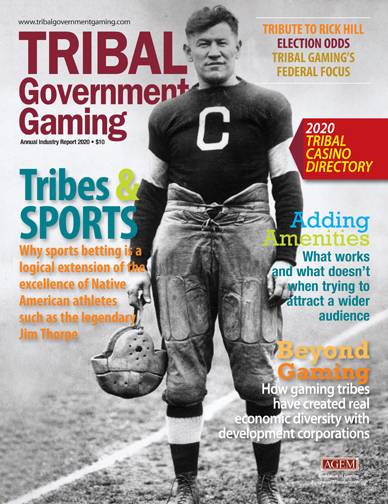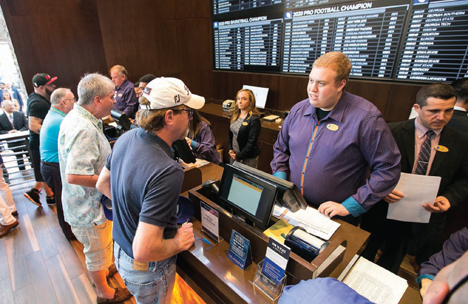
Two years after sports betting was legalized in the United States via the repeal of the Professional and Amateur Sports Protection Act (PASPA), one thing is clear about how the wagers will be introduced into Indian Country. No one state or tribe will be the same.
It started in Mississippi, when tribal casinos (all operated by the Mississippi Band of Choctaw Indians) got the same deal as commercial casinos (only retail sports betting, no mobile wagering).
Next came New Mexico. Tribes there saw no law against sports betting, and opened up retail operations without the permission of the state, claiming the bets were legal under the definition of the Class III games they already offered. Several tribes are now offering sports betting, with no pushback from the state.
In North Carolina, where there are no commercial casinos, the state legislature passed a law that permits the state’s two tribal casinos, operated by the Cherokees, to allow retail sports betting, but not online or mobile.
In New York, sports betting was approved for all casinos, including tribal facilities owned by the Oneidas, the Mohawks and the Senecas. Like the four commercial casinos in the state, tribal casinos are only permitted to accept bets inside the casinos. The state’s racinos were not included in the bill.
In Oregon, tribes began offering sports betting when the state allowed its lottery organization to set up sports betting systems.
In other states, it’s more complicated. California tribes have joined forces with the state’s racing industry to propose a referendum that would allow sports betting at tribal casinos and racetracks—but not at state card rooms, which have been plagued by corruption and seen multiple raids by the federal government.
Arizona has a similar dilemma when it comes to sports betting. The few remaining racetracks want to get involved, and tribes believe sports betting could be a foot in the door that will lead to full-scale gambling.
In Oregon, sports betting via the state lottery has been legal for years, but inactive. After the repeal of PASPA, the lottery relaunched sports betting, opening the door to tribal sports betting. When the Chinook Winds Casino Resort in Lincoln City opened its sportsbook last August, it became the only place on the state’s west coast where bettors can place a sports wager, even before the lottery system went live.
The lottery and the casino took separate roads to a common destination. Chinook Winds, operated by the Confederated Tribes of Siletz Indians, got there first because it was easier to offer sports betting in a brick-and-mortar casino than to make sports betting available to consumers all over the state, both on mobile platforms and eventually from kiosks at retail locations. But that will come.
Sovereign Nations

The Oneidas’ Turning Stone casino in New York has partnered with Caesars Entertainment to offer retail sports betting
The path to sports betting will differ from state to state for gaming tribes. But one thing that doesn’t change is the tribal commitment to sovereignty.
Last year, the National Indian Gaming Association (NIGA) held a policy meeting at the Santa Ana Pueblo in New Mexico, which runs the first tribal casino in the state to offer sports betting, to discuss tribal sports betting and sovereignty in the 21st century. NIGA Chairman Ernest L. Stevens Jr. saw a need to come together during Congress’ traditional recess, and discuss the impact of sports betting on tribal sovereignty and tribal-state politics.
Congresswoman Debra Haaland of New Mexico’s 1st Congressional District, a citizen of the Laguna Pueblo, was the keynote speaker.
While there may be challenging times and concerns, Rep. Haaland gave an inspirational and upbeat message to the motivated audience. Haaland said the 2020 elections are an essential time to come together and unite this country around its core principles: freedom, liberty and pursuit of happiness.
John Cirrincione, CEO of Santa Ana Star, briefed tribal leaders on how Santa Ana integrated the sports betting experience with the rest of the casino floor. Santa Ana designed and developed its sportsbook to meet the needs of its customer base, while ensuring compliance with all tribal regulations and any National Indian Gaming Commission (NIGC) concerns. Cirrincione urged attendees to measure their customer’s appetite for sports betting and seek out the right fit for their tribal operations.
Chairman Stevens stated, “Our work here today and the information provided by these esteemed panelists will help promote and strengthen the sovereign rights of Indian Country. As tribes look to the future, these types of intricate economic and technological issues are likely to continue to impact their economic future. Tribes like the Santa Ana Pueblo and the Mississippi Choctaw, to name a few, are blazing a new path on economic development and what future tribal casinos might look like.
“This movement in Indian Country is greatly enhanced by all tribes working together, understanding the ins and outs and characteristics of this new industry,” Stevens said. “While everybody understands the need to work together, many individual tribes have been working a long time in anticipation of welcoming this new amenity to tribal government gaming.”
Complex Issue
Gaming tribes in the U.S. are ambivalent about the prospect of sports betting. Various states have begun to look at legalizing it, or have already done so. They like the additional revenues, but are leery of about the possibility that grasping it will give the states inroads to dilute existing exclusivity agreements and their sovereign status.
Many tribes believe they already have an exclusive right to offer sports betting, guaranteed to them by their gaming compacts. Opponents of this attitude point out that few compacts actually mention sportsbooks, which only became legal in 2018, when the Supreme Court lifted the federal ban.
Tribes that insist their monopoly includes sports betting have put the brakes on its legalization, and given that tribal gaming often powers one of the biggest lobbying groups in a state, lawmakers pay attention to their concerns.
Yet tribes question the value of sports betting mobile apps, even though that technology is a natural progression, and, as has been shown in New Jersey, is where the most profits are made. They are skeptical, even when the apps are anchored in a tribal casino. Since many tribal casinos are remotely located, tribes fear that if customers can bet remotely, they will be less likely to visit the bricks-and-mortar properties.
Case in point, tribes in Minnesota are concerned that sports wagering apps will discourage foot traffic to their casinos. John McCarthy, executive director of the Minnesota Indian Gambling Association told Sports Handle, “Our major concern is the mobile gambling. We’ve been fighting that forever. Why would you get up on a 20-below-zero-day and come out to the casino when you could just sit at home?
“We’re not opposed in any way to sports betting as an activity,” he said, “but we are concerned about what mobile leads to.”
The association’s position is that any mobile gaming is a negative. And since many tribes depend on the casino to fund their government, provide services and give them a sense of pride, this is a major concern. They have the attitude that once the camel’s nose is under the tent, the tent will collapse.
Moreover, according to McCarthy, the monetary benefits from sports betting are comparatively not that great. “We don’t think it’s a huge amenity,” he said. “We’ve seen how it works. The first thing that starts to go is the live racing at racinos. Then they go back to the legislature and say, ‘We’re not quite making it, we really need some machines,’ and then other groups come in and say, ‘Well, you’re bailing them out, I’m a farmer, so why don’t you bail me out?’”
‘The Strongest Opportunity’?
This attitude isn’t shared by the Pequot and Mohegan tribes, which operate two of the largest casinos in the world, in Connecticut. At a recent legislative hearing, the Mashantucket Pequot Tribal Nation, owner of Foxwoods Resort Casino, sent a written statement that said, “As we see it, the strongest opportunity for the state is in legalizing statewide iGaming, another activity that is currently operating for Connecticut residents in the black market today.” It added, “The tribes believe sports gambling, daily fantasy sports betting and iGaming fall under the exclusivity agreement.”
Washington’s tribes have taken the same stance. But in that state, a tribal-only bill drew major opposition, and many other interests insisted that they wanted to be included, such as taverns, card rooms, OTBs and racetracks.
Rep. Eric Pettigrew’s HB 1975 would limit sports betting to reservations. He declined to add racetracks or card rooms/mini-casinos, arguing that the voters who authorized tribal gaming showed they only wanted gaming at designated places.
Pat LePley, president of the Washington Horsemen’s Benevolent and Protective Association, told lawmakers, “If we’re left behind and not allowed to add to our toolbox as tribes are trying to do here, you won’t fatally kill us right away. But you’ll wound us so badly that we’re going to die and go away pretty soon.”
Although many tribes do claim exclusivity in all forms of gaming, their argument is complicated by the fact that no existing compacts address sports betting by name. They argue that “sports betting” is embraced by the existing language, even if not named explicitly.
As with the Minnesota tribes, the Washington gaming tribes also worry about mobile apps undercutting their efforts to attract visitors to their brick-and-mortar properties. Washington is one of the largest tribal gaming states after Oklahoma, California and Minnesota.
Jerry Allen, a tribal elder of the Jamestown S’Klallam Tribe in Washington and a former head of the state’s tribal gaming association, said, “We want the traffic it generates. The Nevada and New Jersey sports betting model still works, but at some point you have to drive people into your brick-and-mortars. Making sports betting too easy by putting it in convenience stores and the like, as Oregon has done, into the same kiosks with their daily keno game, creates a different problem.”
Puyallup Chairman David Bean told lawmakers that Indian tribes have been “trusted partners” who offer a safe, fair and controlled environment.
“The legislation benefits all of Washington, because tribal gaming benefits tribal and non-tribal communities alike,” said Bean. “You know us. This is our shared homeland. We live here. We work here. We invest our resources here in Washington. And we ask that you adopt an approach to sports betting that maximizes the benefits to people and communities here in Washington.”
Maverick Gaming owner Eric Persson—who owns 19 of the total 44 card room casinos, the largest group of commercial casinos in the state—is backing a rival bill that is currently spinning its wheels in both the House and Senate. Persson is a Washington native, but has been building a rapidly expanding empire of casinos that now includes four states. His bill would allow sports betting at a variety of venues, including tribal, racetracks and card room casinos. He claims it would bring in $50 million annually in state revenue. He also argues that his small, intimate card rooms don’t pose a threat to Indian casinos, since they attract a different set of patrons.
So, sports betting in Indian Country will have a variety of outcomes, but tribes want to be assured that their monopoly on gambling in various states—and their sovereign status—is never threatened.
Sportsbook Design: Evolving with the Laws
Architects and designers are poised to create sportsbooks for tribal facilities, but how they will look may depend on the regulations
Tribal sportsbooks are coming, but they probably won’t be like your father’s sportsbook. In fact, the form new sportsbooks take is going to depend a lot on where they are.

“As the rules and regulations evolve, everybody’s figuring things out as they go, and everybody’s planning for the future.” —Rich Emery, President and Principal, TBE Architects
As states across the U.S. pass laws and develop regulatory structures to allow sports betting, those planning new retail sportsbooks are waiting out the laws and regulations in each jurisdiction before setting those plans in stone, so to speak.
“The incorporation of a new or expanded sportsbook in a casino is an emerging trend that is often solely dependent upon the status of sports betting in that respective jurisdiction, and by extension, the particulars of that specific legislation (exclusivity, types of venues, size restrictions, etc.) and what is allowed,” comments Dike Bacon, principal and planning/business development leader for HBG Design. “It varies widely.”
“Sports betting is kind of an unknown quantity,” agrees Rich Emery, president and one of three principals of TBE Architects. “It’s tapping into a new segment of the gaming market. As the rules and regulations evolve, everybody’s figuring things out as they go, and everybody’s planning for the future.”
“So many of the facilities are waiting for the states to figure out what the evolution of the laws will become, and they’re not really wanting to commit, but they want to be ready for the implementation of sports betting.”
Online/mobile sports betting is one development that will determine many physical aspects of the new sportsbooks, which will not need to be nearly as large as their Las Vegas counterparts.
“Sportsbooks in tribal facilities are completely different than the model out of Las Vegas,” says Emery. “In Las Vegas, they’re almost a casino in themselves. They’re big, they’re very high-tech. For the tribes we’re working with, we’re recommending a much smaller venue that is a little more efficient, but the key is combining it with other uses. So, as this market segment figures itself out, we can adapt as it goes. But it can open even before the regulations allow it as its own venue, but then it can be converted very quickly. So it’s really planning for the future.”
For now, the answer seems to be to create spaces that are versatile and multifaceted—and able to accommodate more than just sports betting.

“We’ve been exploring ideas that would
reinvent a typical sportsbook into something that is a much broader multidimensional entertainment experience.”
—Dike Bacon, Principal and Planning/Business Development Leader, HBG Design
Bacon says HBG Design is working with tribes on the best ways to utilize sportsbook space. “We are currently working with a number of tribal clients that are either preparing to capitalize on new legislation or are interested to potentially get ahead of the legalization curve,” Bacon says. “We’ve been exploring ideas that would reinvent a typical sportsbook into something that is a much broader multi-dimensional entertainment experience.
“Some of our concepts are new build and some involve fairly substantial renovations to existing facilities in order to accommodate sports betting. As an example, we are working on some design concepts that take sports betting out of the prototypical and intimidating back room and integrate the activity into an open, exciting, multi-dimensional center bar or lounge experience complete with communal seating, private VIP areas, and huge interactive video displays.”
Emery agrees that working with multifaceted venues will be key going forward. “What we’re seeing consistently is creation of venues that can be multifaceted—where it can be a food venue, a bar venue, and can be a sportsbook in the future, but can be utilized now,” he says. “We’ve had several clients request that.”
He adds that clients are going for efficiency over extravagance. “The betting terminals actually don’t take up much space, so I’ve done very small sportsbooks. In fact, I’m doing one right now. The biggest change in casinos for us is the efficiency. The attitude of ‘build it and they will come’ changed with the downturn in the market back in ’08, ’09. Everything has turned to efficiency, and sportsbook is no different. We design them where they’re very efficient, but have other sources of revenue as well.”
“We’re currently working on some concepts that integrate sports betting into a multi-use space,” says Bacon. “We think this creates a much more entertaining and less intimidating environment.
“A compelling potential aspect of this type of open or social sports book would be the ability to utilize mobile platforms. It’s interesting to think about the opportunities to use sports betting as a vehicle to get different types of customers and maybe even new customers into the facility and exposed to the casino.
“It’s also really interesting to think about the opportunities to wager on much broader sporting events than the usual sports, and how that might speak to new or different customer types or inform venue design. The potential integration of virtual golf, golf betting, and F&B is an example.”
In the end, sportsbook design will evolve as the market evolves.
“We know style is always evolving like the games themselves,” says Thomas Hoskens, vice president and founding principal of Cuningham Group Architecture. “New venues will weave sports watching, sports playing, sports betting, fantasy sports, skill-based games and casino games all in the same environment with a touch of fashion and fitness.
“What is key to any design, as a new trend is blooming, is that our spaces are adaptable. The sportsbook concept may be here to stay, but we always need to be prepared for what’s coming after it as well.”
“It is moving at a very fast pace,” says Emery, “and it’s evolving right in front of our eyes.”
Stay tuned. —Frank Legato






